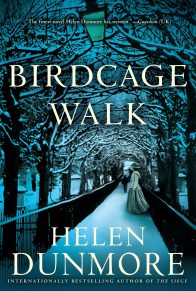All this you will come to understand but can never know, and all of it took place long, long ago in a world that has since perished into peat, in a forgotten winter on an island of which few have ever heard. It began in that time before snow, completely and irrevocably, covers footprints. As black clouds shroud the star and moonlit heavens, as an unshadowable darkness comes upon the whispering land.
At that precise moment around which time was to cusp, Maria Buloh’s burgundy-coloured shoes reached the third and lowest snow-powdered step outside their wooden hut. It was then, as she turned her face away from the hut, that Maria Buloh knew she had already gone too far and that she could no longer return.
Some people say she was simply blown out of the town that night with the furious blizzard winds; that the tempestuous, billowing breath of the storm picked her up and that she rose with it like an angel into the forest beyond, flew like a spectre into the wild lands that lay at every compass point beyond that place that burnt like a fresh bullet hole in flesh.
But that was not the way it was, of course.
Some people even say that she turned into the wind itself, became the gale that was to curse them all. But such terrible winds are not something one can ride as if in a dream. They can only be braced against and it was this which Maria Buloh did, for she was a sensible woman after all, despite what people say, and not a flighty woman whatsoever, and she braced against the wind as though it was a wall that might at any moment fall upon her and she pulled the scarlet coat, that tatty scarlet coat, pulled it tight around her small body. But even that gesture is getting ahead of this story, for the winds were not to blow hard until she had almost walked out of the settlement. And she had some walking to do to get that far.
`Mama,’ Maria Buloh heard a small girl’s voice coming from inside the hut. Then once again, this time more a whimper–`Mama … ‘
Maria Buloh stood there on the step, looking anywhere but at the hut behind her as she tried to soothe the child she had left within. Maria Buloh looked down at her burgundy-coloured shoes, looked at the beautiful impression such battered shoes made in new snow, saw, on the two wooden steps above where she stood, her footprints beginning to disappear in a fresh flurry of snow, and wondered at the nature of beauty, wondered at the small time allowed anything good before it was obliterated. `Aja, aja,’ said Maria Buloh, attempting to soothe the child with the words mothers of her country always used to put their children to sleep. `Aja, aja.’
As she then walked away she did not look back at the hut, but let her gaze drift upwards, let it wander beyond the rag-tag disorder of the settlement into the dark forest. Looked at the night-time blackness above. Looked at the snow falling into the cones of yellow electric light. Watched the snow circling its way earthwards. The way the white flakes eddied and whirled in the air as if they were time passing not constantly but erratically. Maria Buloh watched the way the falling snow showed that the air was never still, but held endless circling complexities, held infinite possibilities for graceful inexplicable movements.
Maria Buloh felt herself at that moment to be watching everything including herself, as if she were in a movie and this were a movie set. By thinking this way she did not hear the distant sounds of her daughter crying out to her from the hut she had just left. Strange sounds. Sounds she would not hear.
`Mama,’ the child cried, but her mother would not hear it.
`Aja, aja,’ Maria Buloh said soothingly, though whether the words were for her or for her child or for no reason whatsoever, nobody can know, for she was already far from their hut and the snow, in any case, deadened all sound. `Aja, aja.’
She continued looking: seeing it all anew, as if it had no connection with her. She saw how the whole black-and-white scene was lit up by the stark electric lights that ran up and down what passed for a street, how on either side of the street were crude vertical-board huts with corrugated-iron roofs and corrugated-iron chimneys, and how to some who lived there it brought back all too painful memories of forced labour camps in the Urals or Siberia. But she knew it wasn’t Stalin’s USSR. Knew it wasn’t Kolyma or Goli Otok or Birkenau. Knew it wasn’t even Europe. Knew it to be a snow-covered Hydro-Electric Commission construction camp called Buffers Gorge that sat like a sore in a wilderness of rainforest.
In this land of infinite space, the huts were all built cheek by jowl, as if the buildings too cowered in shivering huddles before the force and weight and silence of the unknowable, that might possibly be benign, might possibly even not care about people, but which their terrible histories–chronicles of centuries of recurring inhumanities and horrors which they carried along with a few lace doilies and cuffing photographs and odd habits and peculiar ways of eating–could only allow them to fear.
Because not to fear was to imagine a world beyond experience.
And that was too much for anybody.
In those cowering corrals of huts had to live the workers, for in this remote highland country of the remote island of Tasmania that lay far off the remote land of Australia, there was no other human settlement for many miles. There were just wild rivers and wilder mountain ranges and everywhere rainforest that only ceded its reign over the land to intermittent buttongrass plains, or in the higher altitudes, to alpine moorland.
That is what she saw.
What she heard was precisely nothing.
It was the time of the beginning of the great dam-building boom. The time the new Australians came to such wild places to do the wog work of dam-building because work in the cities, which the new Australians would have preferred, was Australians’ work. But Maria Buloh, wife of Bojan Buloh, mother of Sonja Buloh, wasn’t coming to Buffers Gorge.
She was leaving it.
Forever.
So Maria Buloh continued walking down the empty street, a young woman clad in an old coat carrying a small cardboard suitcase, the tracks left by her shoes momentarily bisecting that grim, sour, snow-swept camp, her image already losing its earthly outlines in the falling snow.
The sheet of silence the snow had thrown over the settlement was ripped apart by the approaching clatter of a small engine. The diffuse yellow streaks of a single small headlight made a moving piss-coloured puddle in the drifting snowflakes. Then a hunched rider on a motorbike with empty sidecar shaped out of white nothingness and bore down the street toward her. The rider sped past Maria Buloh, then fifty yards or so beyond slowed as he turned right and slewed to a halt outside the canteen. Maria Buloh stopped, turned, and stared.
In front of the canteen’s main entrance, a double wooden slat door, she saw a dozen women huddled around a fiery brazier improvised from an oil drum, preferring society under such conditions to a warmer solitude. They were clad in a quixotic motley of summer dresses and heavy winter coats, their heads covered with hats of varying exotic types some berets, one slouch hat, two straw hats, a rainbow of beanies. Some women stood and some sat on the empty wooden beer barrels around the entrance, chatting and drinking beer brought out to them by their blokes–husbands and boyfriends and flirters–from the men-only canteen. When the doorway opened for a man to pass in or out, gossipy steam and steamy stories and laughter and the splintering of falling glasses spilt out over the women and onto the main street.
A leather-jacketed and helmeted figure got off the motorbike, and, conscious of making a dramatic entrance, strode past the women into the canteen. The barrel women were momentarily taken with this colourful new arrival. They heard his voice boom through the crowded canteen. `Name’s Eric Preston,’ he yelled. `I’m the AWU organiser and I’ve come to sort out the problem with the reffos. Who’s the rep here?’
But then his strident voice was lost in the babble of tongues that was the canteen drinking its past away and the interest of the women swung to the sight of the solitary woman with a suitcase walking out of the town on such a Godforsaken night to God knew where; the solitary woman who was staring at them and through them as if they were there but had never been there, as if she saw a future akin to the past when they would all once more be scattered with the wind and nothing of this horrible time and place would remain. Her face (so young, so young that it now looks shocking) seemed almost Oriental: the structure of the bones and large eyes different from those of Australians, and the lines–only a few, but deep nevertheless–seemed induced neither by the passing of the years nor by the sun, but as if they had been chiselled into her face by a sculptor to accentuate a strange, exotic beauty.
Some later said she was wrong, condemning what it was beyond them to understand. Perhaps because of this judgement, or perhaps arising from an opposite emotion, some small measure of sympathy for a tragedy that might befall any of them, or perhaps for reasons none of them would ever figure out, they nudged one another and they stopped talking when Maria Buloh looked at them so, and all that any of them or Maria Buloh could hear was the ongoing noise of the men inside.
Maria Buloh turned away. She recommenced walking out of the town. From the canteen she could hear the faint, ever fainter strains of a new American country-and-western song being played on the gramophone. The song seemed to simmer tears, like a goulash stewed out of sadness. As Maria Buloh walked toward the dark forest the babble from the canteen died away. The song became lost in the soft whip of sleet. Maria Buloh’s face was without emotion. Yes, that face–beautiful, yes; young, yes; but something else. What was it? As if fixing her mystery forever, tears–though only a few slid from her eyes and glazed her face.
Behind Maria Buloh ran the tracks that led back to the place from where she came, the tracks that were being lost even as she made them in the falling snow, that were disappearing in the whiteness that threatened to enshroud everybody and everything in that grim little village long, long ago.
And it was some time afterwards, after the canteen had closed and the fighting finished and even the card players had given up for the night and were snoring yeasty breaths into the backs of women who wore their beanies to bed, that the gale rose and the wind began to cry such that it chilled even that wild wet earth.
Aja, aja, it seemed to howl. Aja, aja.
And the old, huge trees could be heard to crack and groan, and the new wires that scratched the vast night sky to whistle eerily, and none of the women who lay awake in their sagging beds that night were soothed by such sounds.
©1997 by Richard Flanagan. Reprinted with permission from Grove Atlantic, Inc. All rights reserved.













